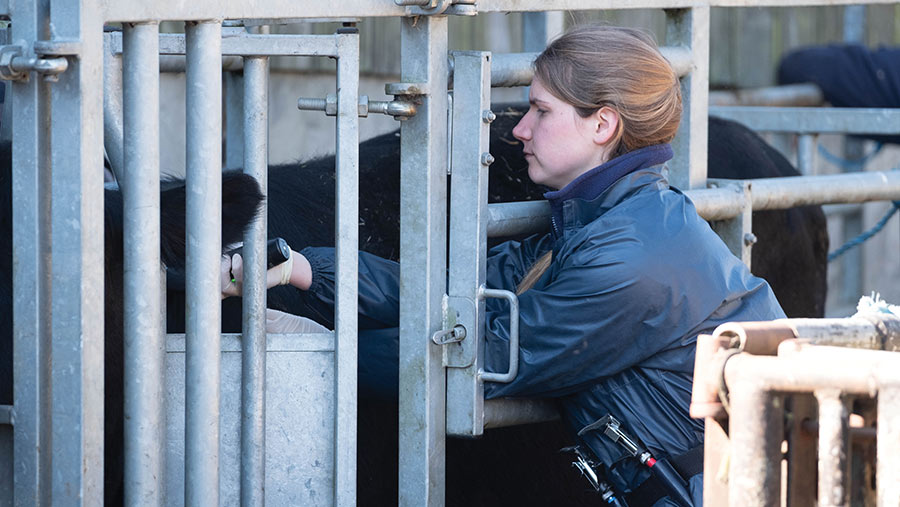How local TB programmes are ‘giving farmers back control’
 © Tim Scrivener
© Tim Scrivener Local TB programmes working in collaboration with farmers, vets and Animal and Plant Healthy Agency (Apha) staff are having a positive effect in helping farmers take control of the disease.
Kingshay veterinary consultant and TB Advisory Service technical director Sarah Tomlinson said those involved in agriculture, such as auctioneers, often have a good idea of what is driving disease locally and know where interventions are best placed to have the biggest impacts.
See also: 4 successful livestock collaborations to learn from
This is true of three TB control pilots: Cumbria HS21, the Pembrokeshire Project and the Oxfordshire Cluster.
Sarah said: “Being part of the decision-making process empowers everyone and helps them feel more in control of the disease.”
She added it also makes farmers think a TB breakdown is preventable and stops making them feel they are playing the “TB lottery”.
Cumbria HS21 (Low Risk Area)
Following an outbreak of TB in wildlife in east Cumbria, the local NFU galvanised 150 cattle farmers to take part in a local badger cull in 2018.
Genotyping revealed the strain of TB had come from an animal bought from Northern Ireland and had subsequently spread to badgers.
With the support of Apha and Defra, badger vaccination was also undertaken. Alongside this, farmers moved from 12-month to six-month testing and engaged tougher biosecurity and farm control measures.
One of these farmers is Chris Addison, who farms a 202ha (500-acre) organic, mixed farm. He went down with TB in February 2017 having been clear for years.
He says he had no clue of the disease implications until they “hit him in the face”.
“I made a point of phoning my neighbours to tell them because I didn’t want anyone to go through what we were going through, and I could see it cascading through the area.
“I love nature; we are in an SSSI [site of special scientific interest] and Countryside Stewardship. For me to do the cull was a double-edged sword,” he adds.
No Mycobacterium-bovis culture-positive badgers have been found in the area since 2019 and all but one herd in the area is now clear of TB.
Chris’s herd has been TB-clear for six years and next spring the area will move back to annual testing. This has given Chris the confidence to start selling pedigree stock once again.
Pembrokeshire project
In Pembrokeshire, 15 farmers and their vets are involved in the project, which centres around managing risk.
The collaboration is between proactive farmers and their vets. The project went to tender and was awarded to Iechyd Da – a consortium of 35 vet practices in South Wales – by the Welsh government.
Neil Watt, from MV Diagnostics, has developed RiskRate, an algorithm that uses existing skin test results to identify animals at high risk of TB and awards each cow in the herd a traffic-light score.
Farmers can then decide how they manage those animals out of the herd sustainably, through culling and breeding decisions.
Brendan Griffin from Fenton Vets and Dr Ben Hopkins from Aberystwyth University are leading the project.
“We have all routes of transmission in Pembrokeshire, but on some farms, residual disease appears to be playing more of a significant role,” explains Brendan.
He adds that on farms that have already been doing this analysis for several years, it has given autonomy back to farmers and their vets.
Oxfordshire cluster pilot (launched 2022)
In Oxfordshire, Apha used genotyping to identify common strains. On the back of this, several cluster groups were formed.
Steering groups have been established involving local farmers, private vets, the NFU, Apha and auctioneers. These groups decide how best to tackle the disease.
For example, where farmers are concerned the disease spread might be caused by deer, deer stalking training has been undertaken.
Activities have also included farm walks on improving biosecurity, badger vaccination projects and advice on risk-based trading when purchasing cattle.
Tony Roberts, from Apha said: “As time has gone on and we’ve been able to understand each other, we realise we are on the same page, and we have the same objective – to get rid of TB. Farmers and vets are feeling more empowered.”
Those quoted were speaking at the National TB Conference in Worcester on 29 November.
